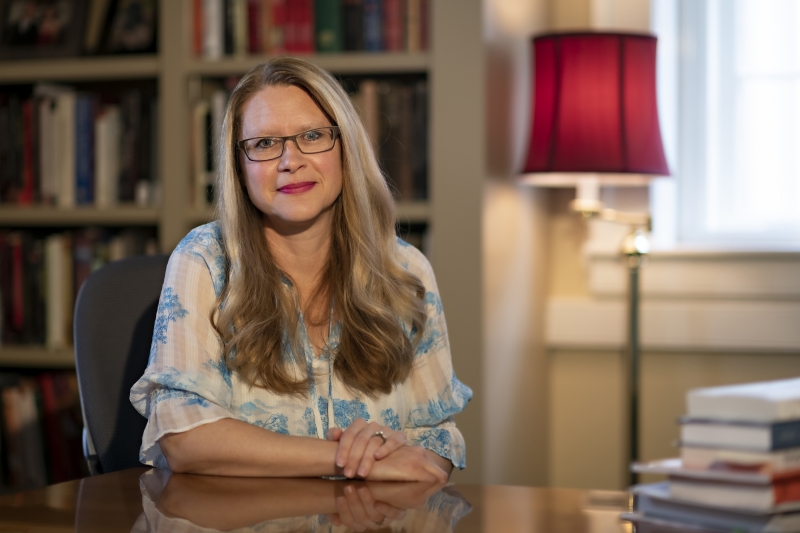Office Hours with Genelle Gertz The professor of English and associate dean of strategic initiatives champions the liberal arts as the best preparation for postgraduate success.
“The abilities to communicate effectively and write clearly are some of the highest-ranked skills that employers are looking for, and a liberal arts degree is especially suited to teaching people those kinds of competencies.”
~Professor Genelle Gertz
Why Teach
My parents reminded me when I was promoted to full professor that I had announced my intention to be a college professor in my eighth-grade commencement speech. My father is a retired Baptist minister and my mother a former high school English teacher, so I’ve always thought of my vocation as informed by what they did. I think I was drawn to the academy from the beginning because there is a service element to teaching.
Outer Edges
I’ve always been interested in looking at the edges of my discipline and charting new territory. My first book focuses on heresy trials from the late medieval period to the Renaissance and how those events shaped women’s prose and autobiographical narratives. It’s an interdisciplinary approach combining legal history with literary and archival analysis. In my discipline and others, we’re recognizing the importance of going back and recovering the writings and lives of people whose experiences were minimized or erased.
I’m about to publish a paper with Rhodes scholar Pasquale Toscano ’16 on Eliza- beth Barton, the nun who opposed Henry VIII’s annulment of his marriage to Catherine of Aragon. I’m using social network analysis to examine Thomas Cromwell’s records on the various investigations of all the people he interviewed to trace who the most prominent members of Barton’s network were. This is important because all 700 printed copies of Barton’s revelations were lost; the network is our closest representation of those visions and texts.
Writing Across the Curriculum and Beyond
Being able to write well is crucial to student performance and success. The abilities to communicate effectively and write clearly are some of the highest-ranked skills that employers are looking for, and a liberal arts degree is especially suited to teaching people those kinds of competencies. What we routinely hear from alumni who were English majors is that they quickly become known as the best writer or speaker, and so colleagues seek them out.
For the last decade, I’ve been very interested in the postgraduate pathways of our majors and thinking that we could do a lot more to help them consider what careers are out there, how they’re best suited for certain areas and industries, and how, in our curriculum, we might be able to draw connections between the present and the future.
Strategic Initiatives
A few years ago, I began having conversations with John Jensen ’01 (dean of career and professional development) about how to prepare and introduce English majors to possible career paths. I began team-teaching a class with Lorri Olan P’17 (senior associate director of career and professional development), which helped students create those initial career documents, such as the résumé, but also encouraged them to reflect deeply about what experiences energized and engaged them. Students came out of the class having a better sense of their internal values and interests, which helped them find a better career match.
As I work on expand- ing that concept to help all humanities majors, one of the great insights for me is that this is not at all about landing a job that’s adjacent to what a student majors in. For example, most English majors are not going to be English professors. The bigger picture is for our majors to tap into the competencies that a liberal arts degree provides them that are valuable to an employer — thinking critically, communicating effectively, engaging in research, working collaboratively,
utilizing digital skills. By knowing early on what feeds their interests, students can analyze different job possibilities and get started on a more concrete career path.
Overall, we need to be working together as a community to make it clear that students really can major in what they love and go into any field. They just need to start thinking about this more deliberately at an earlier stage. If they do that self-reflective work, then they will be much better positioned for a rewarding career.
Assigned Reading
“My students read ‘Designing Your Life’ by Bill Burnett and Dave Evans, which encourages them to prioritize their values from the beginning, and ‘You Can Do Anything’ by George Anders, which charts how liberal arts majors should approach their job search.”
 Professor Genelle Gertz
Professor Genelle Gertz
You must be logged in to post a comment.